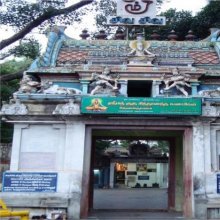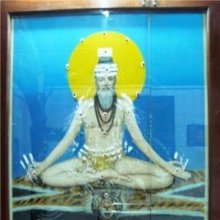Mahakavi, Mahākavi, Maha-kavi: 10 definitions
Introduction:
Mahakavi means something in Hinduism, Sanskrit, the history of ancient India. If you want to know the exact meaning, history, etymology or English translation of this term then check out the descriptions on this page. Add your comment or reference to a book if you want to contribute to this summary article.
Images (photo gallery)
In Hinduism
Kavya (poetry)
Source: Shodhganga: Mālatīmādhava of BhavabhūtiMahākavi (महाकवि) is the name of one of the ancestors of Bhavabhūti.—In this family, with such illustrious ancestors a person was born, whose name was Mahākavi. Bhavabhūti was the fifth in descent from him.

Kavya (काव्य, kavya) refers to Sanskrit poetry, a popular ancient Indian tradition of literature. There have been many Sanskrit poets over the ages, hailing from ancient India and beyond. This topic includes mahakavya, or ‘epic poetry’ and natya, or ‘dramatic poetry’.
Kavyashastra (science of poetry)
Source: Shodhganga: Bhismacaritam a critical studyMahākavi (महाकवि) refers to the composer of a Mahākāvya.

Kavyashastra (काव्यशास्त्र, kāvyaśāstra) refers to the ancient Indian tradition of poetry (kavya). Canonical literature (shastra) of the includes encyclopedic manuals dealing with prosody, rhetoric and various other guidelines serving to teach the poet how to compose literature.
India history and geography
Source: Cologne Digital Sanskrit Dictionaries: Indian Epigraphical GlossaryMahākavi.—(CII 4), ‘great poet’; title. Note: mahākavi is defined in the “Indian epigraphical glossary” as it can be found on ancient inscriptions commonly written in Sanskrit, Prakrit or Dravidian languages.

The history of India traces the identification of countries, villages, towns and other regions of India, as well as mythology, zoology, royal dynasties, rulers, tribes, local festivities and traditions and regional languages. Ancient India enjoyed religious freedom and encourages the path of Dharma, a concept common to Buddhism, Hinduism, and Jainism.
Languages of India and abroad
Sanskrit dictionary
Source: DDSA: The practical Sanskrit-English dictionaryMahākavi (महाकवि).—
1) a great poet, a classical poet, such as कालिदास, भवभूति, बाण, भारवि (kālidāsa, bhavabhūti, bāṇa, bhāravi) &c.
2) an epithet of Śukra.
Derivable forms: mahākaviḥ (महाकविः).
Mahākavi is a Sanskrit compound consisting of the terms mahā and kavi (कवि).
Source: Cologne Digital Sanskrit Dictionaries: Shabda-Sagara Sanskrit-English DictionaryMahākavi (महाकवि).—m.
(-viḥ) 1. An epithet of Sukra. 2. A classical poet.
Source: Cologne Digital Sanskrit Dictionaries: Cappeller Sanskrit-English DictionaryMahākavi (महाकवि).—[masculine] great poet.
Source: Cologne Digital Sanskrit Dictionaries: Monier-Williams Sanskrit-English Dictionary1) Mahākavi (महाकवि):—[=mahā-kavi] [from mahā > mah] m. a great or classical poet, [Piṅgala Scholiast, i.e. halāyudha] [commentator or commentary] (cf. -kāvya)
2) [v.s. ...] Name of Śukra, [Catalogue(s)]
[Sanskrit to German]
Sanskrit, also spelled संस्कृतम् (saṃskṛtam), is an ancient language of India commonly seen as the grandmother of the Indo-European language family (even English!). Closely allied with Prakrit and Pali, Sanskrit is more exhaustive in both grammar and terms and has the most extensive collection of literature in the world, greatly surpassing its sister-languages Greek and Latin.
Nepali dictionary
Source: unoes: Nepali-English DictionaryMahākavi (महाकवि):—n. great poet (a title for Bhanubhakta Acharya);
Nepali is the primary language of the Nepalese people counting almost 20 million native speakers. The country of Nepal is situated in the Himalaya mountain range to the north of India.
See also (Relevant definitions)
Starts with: Mahakavi subandhu, Mahakavicakravartin.
Full-text: Mahakavi subandhu, Hrittoshini, Bandhakaumudi, Nicula, Vrittacintaratna, Muka, Caturhotar, Bhavabhuti.
Relevant text
Search found 21 books and stories containing Mahakavi, Mahākavi, Maha-kavi, Mahā-kavi; (plurals include: Mahakavis, Mahākavis, kavis). You can also click to the full overview containing English textual excerpts. Below are direct links for the most relevant articles:
Kavyamimamsa of Rajasekhara (Study) (by Debabrata Barai)
Part 6 - Haraṇa (Plagiarism) < [Chapter 3 - Contribution of Rājaśekhara to Sanskrit Poetics]
Part 8.14 - Characteristics of Grīṣma-kāla (summer season) < [Chapter 5 - Analyasis and Interpretations of the Kāvyamīmāṃsā]
Part 1.2 - Meaning and changibality of the term Sāhitya < [Chapter 5 - Analyasis and Interpretations of the Kāvyamīmāṃsā]
Sri Sri - The Icon of the Progressive Movement < [October – December, 2008]
Mahakavi Viswanadha Satyanarayana < [January – March, 2004]
Unity < [June 1944]
Elephantology and its Ancient Sanskrit Sources (by Geetha N.)
Brihad Bhagavatamrita (commentary) (by Śrī Śrīmad Bhaktivedānta Nārāyana Gosvāmī Mahārāja)
Verse 1.4.42 < [Chapter 4 - Bhakta (the devotee)]
Sahitya-kaumudi by Baladeva Vidyabhushana (by Gaurapada Dāsa)
Text 7.113 < [Chapter 7 - Literary Faults]
Text 1.5 < [Chapter 1 - The Purpose of Poetry]
Annadatri-carita (study) (by Sarannya V.)
2. Annadatri-Carita (classification and subject-matter) < [Chapter 3 - An Introduction to Annadatri-carita]

